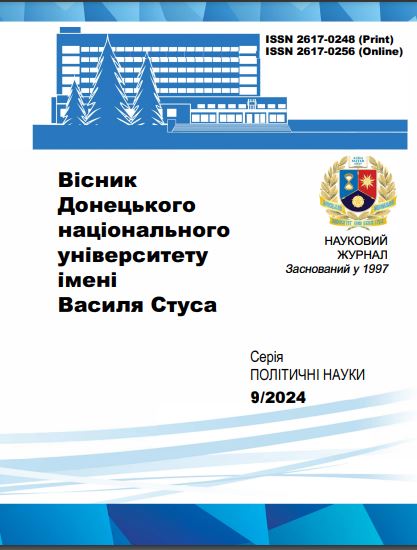Mechanisms of hybrid warfare in the humanitarian sphere
DOI:
https://doi.org/10.31558/2617-0248.2024.9.4Keywords:
hybrid warfare, information aggression, humanitarian sphere, humanitarian policy, humanitarian resilience, national securityAbstract
The authors analyzes the key characteristics of the hybrid environment, the main indicators of propaganda as one of the key methods of Russian hybrid warfare, the goals of Russian hybrid warfare, the stages of deployment and conduct of a hybrid conflict, and the main sources of possible vulnerabilities in the humanitarian sphere, where the enemy can conduct hybrid destructive influences.
It is established that the threat of hybrid warfare requires special efforts from state institutions to strengthen international security cooperation. The dynamics of modern international relations show that today it is important to move towards a global security system that can minimize cyberterrorism, cyberwarfare and cybercrime.
It has been proved that hybrid warfare in the humanitarian sphere is characterized by targeted cognitive influence on the relevant target audiences in order to distort the adequate perception of reality and disrupt the activities of social groups, manipulate their consciousness and impose narratives favorable to the enemy in understanding certain current phenomena in society. The continued presence of the Russian mass product within the Ukrainian socio-cultural environment created opportunities for further transmission and perception of hybrid information attitudes and fakes of Russian propaganda.
It is stated that in times of war, the importance of international law, in particular such components as international security law, international humanitarian law, and international media law, is significantly reduced. The integrity of the humanitarian space of the State requires a national cultural and communication environment, which is ensured by the priority of the Ukrainian language and a network of effective channels of cultural relations covering the entire society.
It is summarized that in order to effectively counteract the threats of hybrid warfare and ensure an effective system of national security of the State, it is important to form a comprehensive system that will allow timely response to hybrid challenges and dangers in society, as well as proactively form a national system of humanitarian resilience.
References
Ablazov І., Harkavyi Y., Mokliak S. (2023). Information Security of the State Under Conditions of Hybrid Warfare: Mechanisms of Ensuring. Khazar Journal of Humanities and Social Sciences. Vol. 26, No1, Special Issue. DOI : https://doi.org/10.5782/.kjhss.2023.51.63 (дата звернення: 08.08.2024).
Cullen P., Reichborn-Kjennerud E. (2017). Understanding Hybrid Warfare, Multinational Capability Development Campaign (MCDC). URL: https://assets.publishing.service.gov.uk/government/uploads/system/ uploads/attachment_data/file/647776/dar_mcdc_hybrid_warfare.pdf (дата звернення: 08.08.2024).
Сащук Г. М. Державне регулювання гуманітарної політики в умовах гібридної війни. Політологічний вісник: зб-к наук. праць. КНУ ім. Т. Шевченка. К. : ТОВ «Вадекс», 2024. Вип. 92. DOI: https://doi.org/10.17721/2415-88ІХ.2024.92.313-321 (дата звернення: 09.08.2024).
Телешун С. О. Управління людьми в нестабільному інституційному середовищі. світові тенденції та українські реалії. Вісник НАДУ. Серія «Державне управління». 2019. № 1. С. 60-66.
Think Tank reports on Russia’s war of aggression against Ukraine. European Council. 2024. URL: https://www.consilium.europa.eu/en/documents-publications/library/library-blog/posts/think-tank-reports-on-russia-s-war-of-aggression-against-ukraine/ (дата звернення: 09.08.2024).
Таркін В.П. Інформаційні війни у сучасному політичному просторі як феномен ХХ-ХХІ століття. Дис. д-ра філос. : 052. Одеса : Національний уніерситет «Одеська юридична академія», 2023. URL: http://dspace.onua.edu.ua/bitstream/handle/11300/27051/%D0%94%D0%B8%D1%81%D0%B5%D1%80%D1%82%D0%B0%D1%86%D1%96%D1%8F%20%D0%92.%20%D0%A2%D0%B0%D1%80%D0%BA%D1%96%D0%BD.pdf?sequence=1&isAllowed=y (дата звернення: 10.08.2024).
Крутій В. О. Трансформація політичної системи суспільства в умовах гібридної війни. Дис. к.політ.н. : 23.00.02. К. 2018. 222 с.
Justifying the Unjustifiable: Russia’s Aggression against Ukraine, International Law, and Carl Schmitt’s «Theory of the Greater Space». Chinese Journal of International Law. URL: https://academic.oup.com/chinesejil/article/22/3/409/7285836 (дата звернення: 09.08.2024).
The toll on Russia from its war in Ukraine, by the numbers. Atlantic Council. 2024. https://www.atlanticcouncil.org/blogs/new-atlanticist/the-toll-on-russia-from-its-war-in-ukraine-by-the-numbers/ (дата звернення: 12.08.2024).
Roy D. (2023). How Bad Is Ukraine’s Humanitarian Crisis a Year Later? Foreign Affairs. URL: https://www.cfr.org/in-brief/ukraine-humanitarian-crisis-refugees-aid (дата звернення: 12.08.2024).
Андрієвський Т. Г. Гібридна війна у політичному процесі: особливості проявів та засоби протидії : Дис. д-ра філос. : 052. Харків : Харківський національний педагогічний університет ім. Г. С. Сковороди, 2021. 259 с.
Reporters without borders. World Press Freedom Index 2022. URL: https://rsf.org/en/index?year=2022 (дата звернення: 12.08.2024).
Пасічний Р. Національна безпека України в епоху глобалізації. Українська національна ідея: реалії та перспективи розвитку. 2012. Вип. 24. С. 108-112.
Гібридна війна: in verbo et in praxi : монографія. Донецький нац. ун-т ім. Василя Стуса / заг. ред. Р. О. Додонова. Вінниця : Нілан-ЛТД, 2017. URL: http://dspace.tnpu.edu.ua/bitstream/123456789/13573/ 1/Khalikov_ monohrafiia.pdf (дата звернення: 12.08.2024).
Кравченко М. Гібридна війна: її фронти і методика. URL: https://azov.org.ua/hibrydna-viina-yii-fronty-i-metodyka/ (дата звернення: 12.08.2024).

